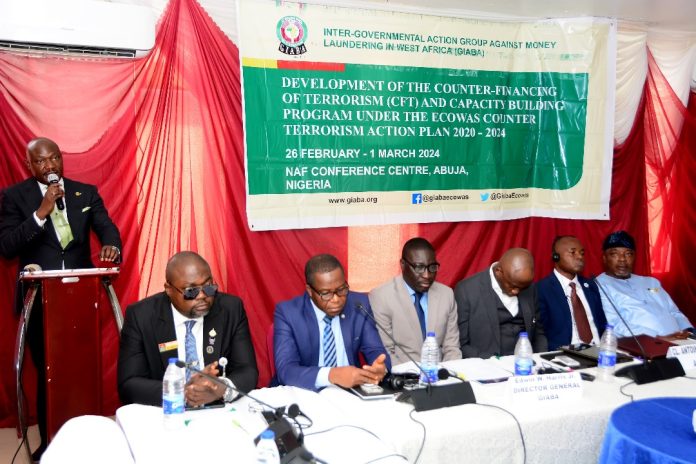The Nigerian Financial Intelligence Unit (NFIU) has said the increasing rate of poverty and the attendant hardship ravaging citizens of the West African subregion can be attributed to the activities of terrorists operating in the region.
Mr. Muhammed Jiya of NFIU in his address yesterday at the opening of a workshop for the Development of the Countering the Financing of Terrorism Curriculum/Training Modules for Capacity Building under the Ecowas Counter Terrorism Action Plan 2020-2024 by Inter-Governmental Action Group Against Money Laundering in West Africa (GIABA), holding in Abuja, said Terrorism in West Africa has been a significant security challenge for several years, with various militant groups operating in the region.
He named some of the groups to include the Boko Haram, Islamic State West Africa Province (ISWAP), Al-Qaeda in the Islamic Maghreb (AQIM), Ansaroul Islam, and Jama’at Nasr al-Islam wal Muslimin (JNIM) among others.
“The activities of these terrorist groups have had devastating consequences for the affected countries, leading to loss of life, displacement of populations, economic hardships, and exacerbation of existing social tensions,” he said.
Muhammed Jiya said among the top 10 countries in the Global Terrorism Index (GTI) 2023 of impact of Terrorism in countries of the World, there are four West African countries.
“Efforts to counter terrorism in West Africa involve both military operations and initiatives aimed at addressing the underlying factors driving radicalization and recruitment into extremist groups,” he said. “Regional cooperation, intelligence-sharing, and capacity-building efforts are also crucial in addressing the transnational nature of the threat posed by terrorism in West Africa.
“That is why the development of the CFT Curriculum/Training Modules for Capacity Building becomes critical!
“This workshop stands as a testament to our collective commitment to learning, growth, and innovation. As we embark on this journey together, we should strive not to just be passive attendees, but active participants in a dynamic exchange of ideas, knowledge, and expertise.”
Also speaking the Director-General of GIABA, Mr. Edwin W. Harris Jr. said Money laundering and the financing of terrorism continue to adversely impact the socio-economic development, peace, and security of ECOWAS member States and beyond.
“In the last decade, the ECOWAS community has experienced an increasing level of terrorism, radicalisation, and violent extremisms at an alarming rate,” he said.
He called on the experts attending the workshop to give priority to the judiciary in the development of the training modules. According to him, “The judiciary should be more responsive in the adjudication of cases of terrorism and terrorist financing to deprive criminals of the proceeds of their crime, recover stolen assets, wherever located, and dismantle criminal enterprises.”
In his remarks, the National Coordinator of National Counter-Terrorism Coordination Centre, Rear Admiral Y.E. Musa, said in the West African sub region, particularly the Sahel and Lake Chad region, the activities of the various terrorist groups have persistently increased despite the sustained efforts and cooperation among national governments within the region.
He noted that the growth and continued spread of terrorism in this region has been accentuated by the important role played by finance. “Terrorist organisations will not survive for long without finance because terrorism is an expensive venture which requires sustained supply of money for its sustenance,” he said.
He said disrupting the network of terrorism financing requires developing the capacity of various government actors saddled with this responsibility.
“This include the criminal justice and law enforcement officials to investigate, prosecute and adjudicate terrorist financing.
“There is also the need to provide specialised training on special investigation techniques, the freezing, seizing and confiscation of terrorist assets, and strengthening regional and international cooperation to counter the financing of terrorism,” he said.


